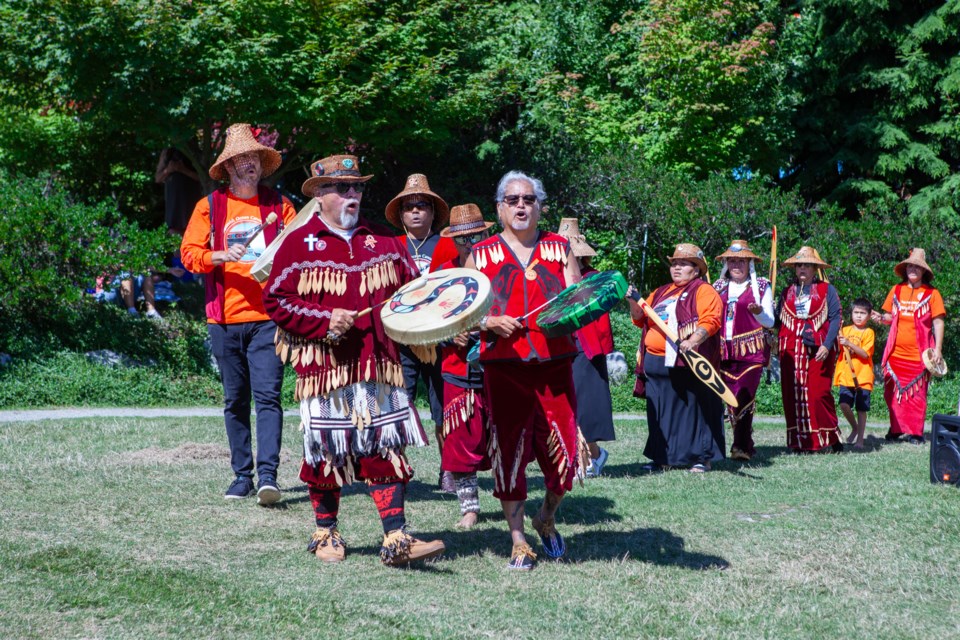A dozen members of the Sḵwx̱wú7mesh Nation last weekend shared myths and music to honour a restored tradition — and a storied watercraft marking its 30th birthday.
Paddlers from the Squamish Ocean Canoe Family travelled to Gibsons, near the traditional Sḵwx̱wú7mesh village sites of Schenks and ch’ḵw’elhp, where they presented an hour-long cultural program as part of the summertime Music in the Landing series.
“We are thankful to the Town of Gibsons for giving us a spot to rest our bodies to nourish our souls and have a good rest for the evening, and especially our canoe that looks after us on the waters,” said Alroy “Bucky” Baker, a speaker for the Sḵwx̱wú7mesh Úxwumixw (Squamish Nation) whose traditional name is K’etximtn. “We always look forward to August to come back here and visit our homelands.”
Three weeks ago, the Squamish Ocean Canoe Family loaded their seagoing canoe, carved in 1993 from a centuries-old tree, and began a voyage over the Salish Sea to lands of the Muckleshoot Tribe in Washington State. They covered the distance in four day-long sprints.
More than a hundred canoes paddled by coastal First Nations — from Oregon to Alaska — converged on Alki Beach, near Seattle. In the House of Awakened Culture, built by the Suquamish Tribe, delegates feasted and made presentations.
It is the first time the full-fledged Tribal Journeys tradition has been observed since 2019. The annual reunion of West Coast canoe cultures was not held for three years due to the COVID-19 pandemic.
“This year, they gifted some of the tribes from the States a seagoing canoe,” added Baker, “thanking them for their perseverance in the fight: not just in the last 50 years, but also their ancestors that fought the governments that were coming into the territory.”
The Tribal Journeys custom was established in 1989 by Emmett Oliver, a member of the Quinault Indian Nation who wanted to ensure that Indigenous people were represented during the Washington State centennial. According to his daughter, Marylin Bard, Oliver dreamed that one day the event would grow to include 100 canoes from West Coast nations.
On July 30, his dream was realized: a hundred canoes arrived for seven days of protocol. Each canoe family, ordered from the most distant community to the nearest, was accorded two hours to share traditional dances, stories and songs.
The Sḵwx̱wú7mesh Nation most recently hosted the gathering in 2001, when paddlers from Hawai’i beached their vessel on the shores of Howe Sound. “It took them a month to paddle up,” said Baker. “They stayed with us for the week and then they paddled back home. And they only used stars as navigation, just like their ancestors did.”
Zena Ariwirawan first took part in the tradition in 2016 alongside her four siblings. They paddled together to honour their mother who had just passed away. “I was a late starter,” Ariwirawan said. “For us, it’s all about getting our identity back. It’s about getting back into the way of life that we used to do. To actually be part of the journeys, the way the ancestors traveled and the way they gathered and the way they feasted together, it makes a real connection between the different nations.”




